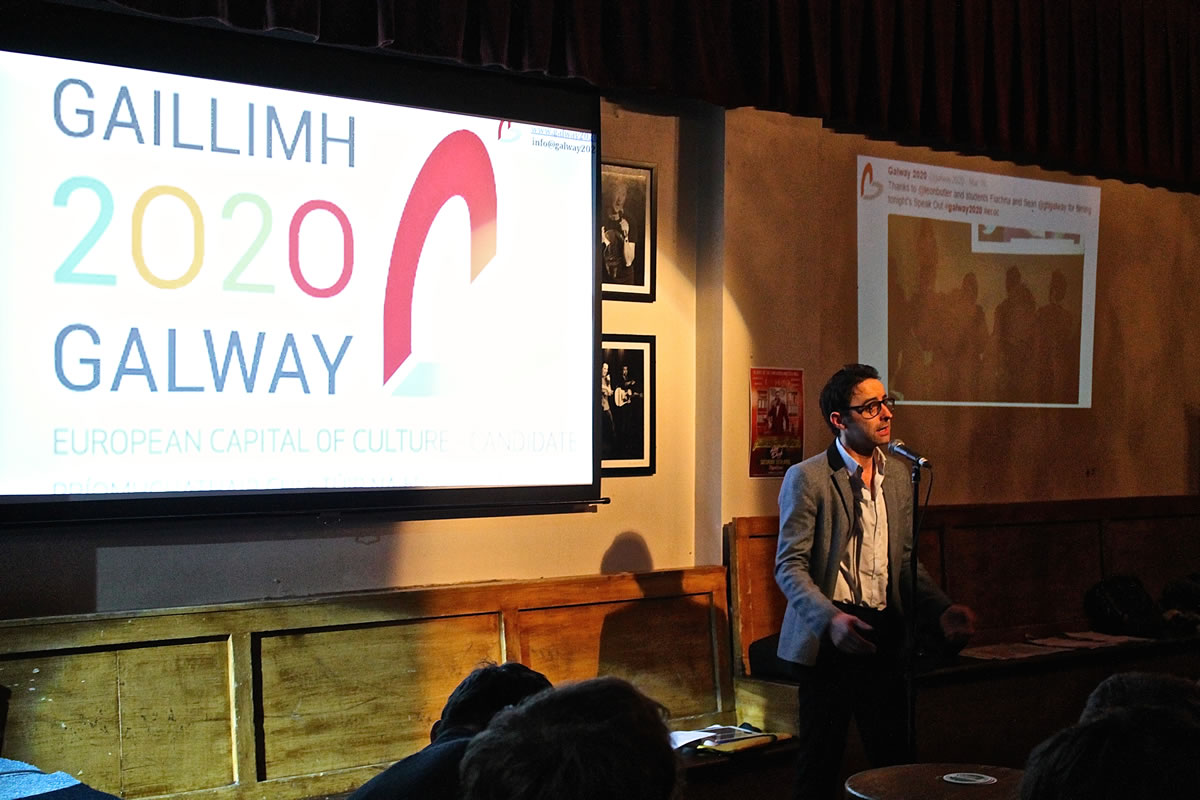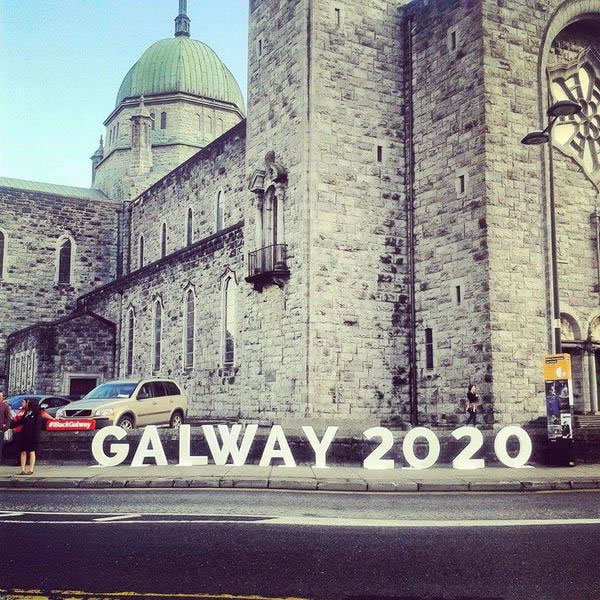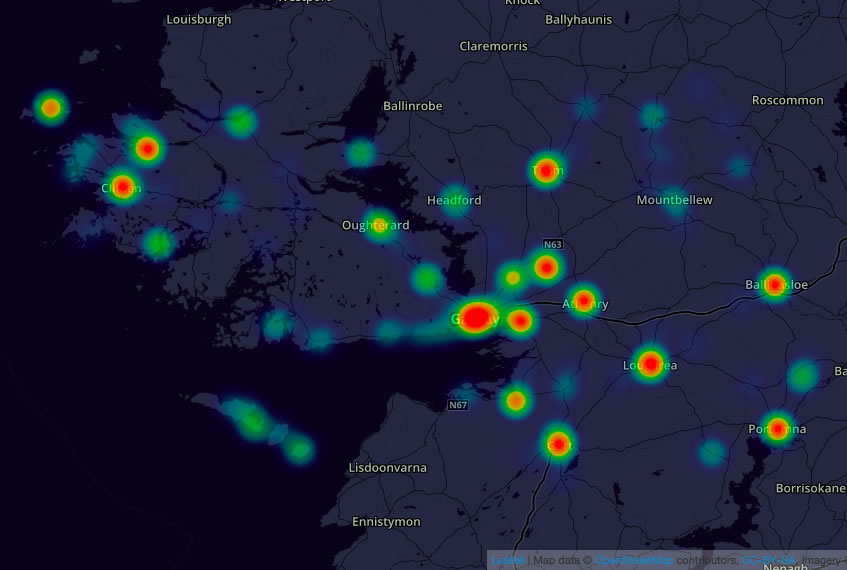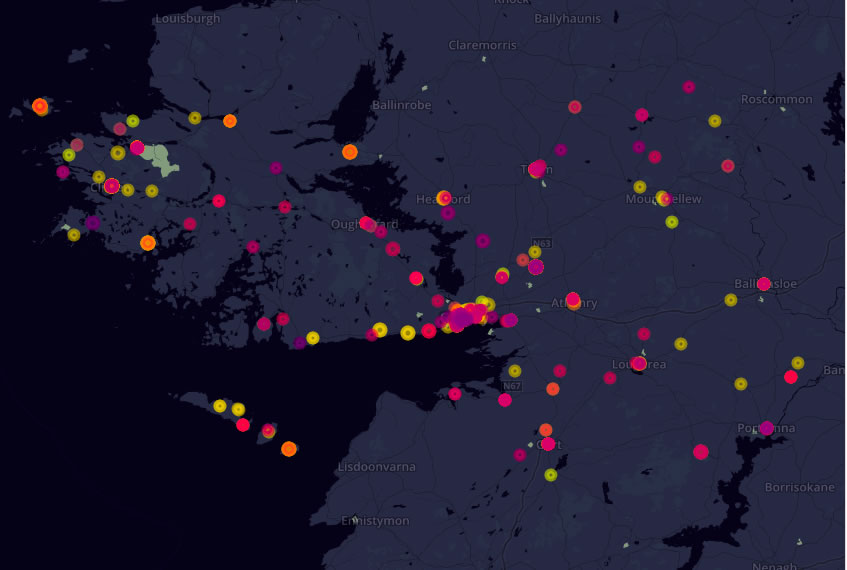Dr Patrick Collins – Economic Geographer
Patrick is an economic geographer at NUI Galway. He is also NUI Galway's lead consultant for the Galway European Capital of Culture 2020 bid team.
More from...
Tell us a bit about yourself
I'm from Galway. I went to the Jes Bunscoil and Jes Secondary. Happy days; a good time all told. The Jesuit education helped you realise yourself as an individual. It was great - it was really great. Their ethos is much lauded, for me it was about just trusting in people, and it was distinctly non-authoritarian. There was a liberal attitude of, ‘If you want to do it, do it, but deal with the consequences'. And that's really great. That trust was a really important part of that school. After that I came to NUI Galway to study Geography and Economics and I've been stuck between Geography and Economics ever since.
After I finished my undergraduate I did an MA in Applied Economics and then I went over to the UK and did a PhD in Human Geography. Then I came back here for a year and, I'm sure you heard this one before...I'm still here ten years later. I came back here as a Postdoctoral researcher in the Whitaker Institute and did some fairly interesting work there; it's very different to where I am now, but really informs where I am now.
So what does your work for the University entail?
I'm an economic geographer. I'm interested, in the most purest form, why some places are wealthy and others are not. I'm seriously interested in the spatial distribution of wealth. At the very most basic form, that's it. People look at countries and the difference between countries. I'm more interested in the difference between localities. My PhD looked at the golden era of the late 90s early 00s and focused on the software industry - how software and the software industry is going to radically transform geography. The idea that you could be in Belmullet or you could be in Boston and it didn't matter because you're all online - that had huge implications for geography. Some people said that geography was a dead discipline because of this, but I set out to look at what the new geography of the contemporary world that we live in is and in many ways, its far more interesting.
Geography and wealth distribution used to be fairly easy to understand. If you go long enough back, it has to do with soils. So wealthy places had good soils, good agriculture, good economies. Then through the 18th century and industrialisation, things changed; wealth was about natural resources underneath the soil, but wealth was still tied to geography. So places like the North of England and the East Coast of the United States became very wealthy because they had the coal, the steel and those natural resources for industrialisation. Now, in this world, wealth is digital; it's anywhere. There is no tie between physical geography and wealth. Countries like Singapore, countries like Ireland, with no natural resources, no real good soil to speak of in terms of the kind of scale that you need to be a wealthy economy, are wealthy economies. That's really interesting, because it's a complete detachment from the actual place that we live in, the actual physical geography. That's the starting point of a lot of my work.
When I came back to Galway, I looked at location patterns, and was inspired by the question; ‘Why are so many American multinationals setting up in Ireland?' And everybody said, ‘Well, it's corporation tax', and you say; ‘Yes, that's true, but it's not all of the story'. And it absolutely categorically is not. I would say that they're choosing Ireland for many reasons, much more interesting than a tax regime. After talking to heads of the likes of Microsoft and Dell and Intel and talking about the story of their location in Ireland, words that kept on coming up have been words like creativity, words like culture, words like livability, words like authenticity. These are the keywords that mark out Ireland in the location decision of these global entities. Corporation tax is fine; it sits somewhere in an excel sheet to do the numbers, but what really seems to be active in the decision process has much more to do with those keywords. So it's the ability of our workforce to critically engage with tasks, it's the perceived innate creativity in the country, it's this notion of Ireland as being a very livable place, a good place to bring up your family. Of course, there is a real geography at play - its access to a European market - that's huge as well. But those other words were the words that piqued my interest and pointed me in another direction.

"Galway is exciting, it's on the edge, it affords us a unique perspective on life, and that all comes down to Geography… I would say that."
With that in mind, how does Galway rate?
The Creative Edge project that I kicked off in 2009 set out to explicitly try to do that - to see exactly how places rate with all these words. It's really a cultural index. We tried to map across the western seaboard and across the island of Ireland, so you're looking at identifying the hotspots of culture. You're taking all these metrics that are disparate and never brought together and you're adding your own metrics to it to basically put an index of culture on places so you're not going to have an answer for one place in an absolute term, you're only going to have it relative to other places. So what you do is you go out and you map things that are mappable like the amount of creative industries, you map the extent of your cultural infrastructure. There are international standard categories that include things like festivals, that include things like your gastronomy sector - any metrics we have on livability from health indicators, to education standards, to school class sizes. It's a trawl, its datamining in a near mind numbing way, but you do it to try to see how cultural a place is and as it turns out, Galway does well. An index like this is only really as good as the extent to which it's mapped. So our plan now is to put this index out across Europe to see really and truly how culture, creativity, livability, impact on the economic performance of places.
What do you enjoy most about all this?
What I enjoy most is that I think we're getting closer to the answer of how wealth is distributed and why wealth is distributed around different spaces. I think policy and politicians – some academics as well, tend to go for easy answers in terms of understanding why certain places are poor and certain places are rich. What we're doing is trying to pick the complexities of different places and really see through the prism of culture and creativity why wealth is distributed in certain ways. And one would hope, and what really would excite me about it all, is that we finally get to understand the true contribution of culture and creativity. That's really it.
I mean, culture and the arts add ons in the policy sense. If you tracked the amount of references to culture in parliament around the world. One of our team, David Kelly, did it for the Dáil - he looked at speeches made by a recent Minister for the Arts and you just see that culture and the arts just doesn't feature because there's no politically coherent case made for it. I don't know that this is the answer for it, but I do think it points us more towards making a case for culture, to say that culture has a really active role in the determination of which places win and which places lose in the current economy.
So what impact does culture have on our city?
It's absolutely fundamental. In terms of economic impact, you can go through a fairly simple process of adding up all the different festivals and you'll see, you'll get x million out of culture each year, but that's not it. That is just the tip of the iceberg in terms of how important culture is to the economy of Galway. It's the innate associations that people have of a cultural Galway, people's perceptions of a cultural Galway - it's just so very difficult to even truly articulate this. Culture as fundamental to this urban and social psychology of Galway has a massive economic impact.
I'll give you one example to ground that lofty statement; if you sit down to talk to one of the major employers in the city, and you ask them what is it about Galway, the response is; ‘I know I can attract people from 43 different nationalities to Galway because it's a place that they'd want to come and live'. That's directly related to the cultural aspect of the city, it's directly related to the cultural affinities and the cultural perceptions of Galway that people can look at it from around the world and see it as that cultural place, and be attracted to come here to work here. This is essentially what this Creative Edge project is trying to point out. When you look at our policy of attracting inward investment, our policy of growing local companies, indigenous corporations, we've been looking at it completely backwards. What we have been doing is trying to make places attractive to jobs, so we've heard this debate most recently in the midlands - ‘We don't really have any FDI coming here, so we go out and try to build these industrial estates, then we'll look over to America and hope that somebody over there will take over this massive shell that we've built and come over and bring jobs'. That's completely wrong and Galway proves this. Galway proves that what you need to do is you need to build places that are attractive to people and once the people come, the jobs, absolutely guaranteed, will follow. That's a pretty simple suggestion, but if you're to follow through all of our policy approaches to developing the economy and developing industry, we've been going completely ass ways at it, because all we've been doing is just building locations in the hope of attracting jobs, as opposed to building locations to attract people. So that's ostensibly what a cultural index tries to do. It says, if you make this place cultural, people are attracted to it. If you abide by authenticity, if you abide by promotion of creativity, if you abide by remaining true to a place, not building endless suburban sprawl and ripping out the soul or identity of a place, if you try to keep it as an attractive offering to people, that's the key. Jobs - they'll follow. We have plenty of examples of that in Galway, so that's why culture is so important to Galway.
What's your vision for Galway as a cultural utopia.
My ideal for Galway would be that Galway would be that viable destination for young people from all over the world to come and to make whatever they want - it could be creative, it could be cultural, it could be medical devices, it could be crisps. I don't know, I don't care, as long as people come to Galway and as long as we enable them. It's about how we can legislate for creativity. There are simple things that you can do to just unlock creativity in everyone. And that's a key thing in this bid for Capital of Culture, this perception that a cultural Galway is about those ten to 15 people that drink in Neachtains or whatever, that clique of people that the national media constantly come to and ask about the culture of Galway. That is not it at all. What's exciting about this bid for the Capital of Culture is the possibility of unlocking the creative potential of everybody. If we could do that even in the bid, then who cares if you get Capital of Culture or not if you have everybody turned on to just exploring their own innate creativity in whatever form that takes, then bingo; I think we're there. I think we've won.
It's a problem that the arts and culture sector have worked themselves into that there is this perceived exclusivity or proclivity about it and if that maintains, then they simply will never get the kind of support they're looking for.
What needs to be done to achieve this?
We're out there pushing a cultural image, we're spending more money on pushing a cultural image of Galway than we're spending on making it cultural Galway. This notion that Galway as a cultural place is a guarantee - that's exactly what's going to lose us the Capital of Culture unless it's properly addressed. We're going to see Galway going down a path whereby we'll be swapping places with Limerick, where Limerick sits in the national consciousness, Galway will sit in the national consciousness in 20 or 30 years time. You look at the international literature in terms of the urban cycles of places. When your place is attractive to single sex parties getting out of mini buses for Friday and Saturday nights, they're the last people to come to your place. Nobody else comes after that and that's what Galway is moving towards if its not careful. And of course it is, why wouldn't it? Because publicans want to make money; that's absolutely fine, but we're not investing in culture in Galway, and we haven't, so we won't have this cultural label for long unless we invest in it. We were lucky to get it by happenstance, but there's no luck in keeping that. There's hard work and investment in keeping that cultural label.
The best thing about this bid for European Capital of Culture is that culture is being talked about. Culture is part of the conversation now in the offices of City Hall, in the offices here, in offices and workplaces across the city. And so absolutely that's what I think is going to hopefully make a change.

How does art and culture influence your daily life?
Art and culture is everywhere in every expression from the pull of a hurl all the way across to whatever it is you're cooking that night. Technology is helping us all to unlock our innate creative talents. Every time you open up a word document, you're creating culture and every time you write an email, this is culture - we're all producing culture all the time. It's a problem that the arts and culture sector have worked themselves into that there is this perceived exclusivity or proclivity about it and if that maintains, then they simply will never get the kind of support they're looking for.
"If you abide by authenticity, if you abide by promotion of creativity, if you abide by remaining true to a place, not building endless suburban sprawl and ripping out the soul or identity of a place, if you try to keep it as an attractive offering to people, that's the key."
What drives you?
Genuinely, what drives me is how we can create a fairer distribution of wealth. We live in a capitalist system where the distribution of money is very regimented, predetermined, and can't really be affected by the majority of the people. I do think we're on the cusp of a change. I know we've been through a massive economic crash, and the worst thing to come out of that crash is that we didn't come up with a viable alternative to our system of economic rule. I just don't think we're fully ready yet. But I do think we're getting towards it when you look at the intersection of technology, creativity and globalisation. I do think the barriers to entry in terms of entrepreneurship, in terms of whatever kind of economic path you want to choose, are falling. Corporations are losing control and culture is fundamental in that. Cultural industries were the first to do it. Music did it, audio visual is doing it, publishing. Corporations don't know how to respond. I think cultural industries act as that canary in the mines to show what all industry can do and that when we truly exceed to this increasingly digital world, that we can create a real democratic distribution of wealth, whereby the predetermined locked-in ways of capitalism can be unlocked and the fruits of entrepreneurship can be enjoyed by many, many more people.
What project are you most proud of?
I'd have to say this idea of indexing culture through Creative Edge, and we have a follow-up project to that now called Creative Momentum, which is just going to kick off in the next couple of months. I think that's what I will be most proud of because one would hope it's part of the answer in terms of unlocking the true contribution of culture to our economic and social well-being. Not that it's going to fully unlock it, but we'll be able to have a conversation maybe in three or four years' time and we could be closer to saying, ‘Here's a definitive answer about what culture is worth to Galway and what culture is worth to Roscommon and what culture is worth to all these other places'. I think that could be pretty cool.


Who or what has been your greatest influence?
In academia, we're constantly influenced and inspired by hundreds of people around the world on a daily basis. There are key academics like Jamie Peck and Ron Boschma – not necessarily in the public consciousness - but they're writing really, really interesting stuff about how we shift our perception and valuation of wealth and all that is really interesting. In a more local context, the previous director of the Whitaker Institute, James Cunningham, was a great influence and help.
Personally, I am inspired by my family, a wife that shares my ideology, and daughters that I can only hope to make a good life for. My parents; Mammy obviously, and though my father Brendan passed on earlier this year, I still feel his influence in all things that I do.
We seem to be determined to give acclaim to individuals. I don't think any one answer ever comes from any one person. The good answers always come through a filtration process from different people and they end up being voiced by one person. That's the history of how innovations happen.
Finally, what do you love about being here in this city?
There's an intimacy about Galway. It's an ideal size for all that's going on in it. It's truly a human scale urban entity. It is probably a little bit too small for us as global beings now in the 21st century, but at the same time, in terms of a social experience, it's just the perfect scale. The key to Galway is its people and a genuine openness that there is amongst these people.
A term that comes to mind in considering Galway is ‘cosmopolitan traditionalism'. The ability to look anew at what might have always been there. We have seen that down the years in the work of Druid, Macnas and the GIAF, and now we are seeing it in the gastronomy sector in Galway. Galway is exciting, it's on the edge, it affords us a unique perspective on life, and that all comes down to Geography… I would say that.
- Dani Gill - Previous
- Next - Ruby Wallis